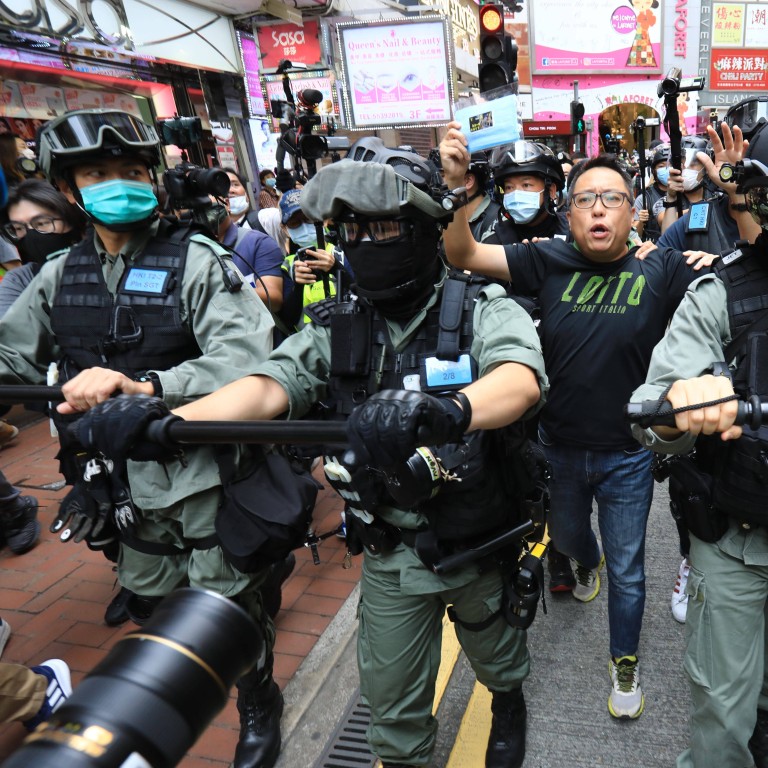
Hong Kong court rejects activist’s attempt to quash colonial-era sedition charges on constitutional grounds
- Judge Stanley Chan calls defence strategy ‘misconceived’, saying their arguments ‘obviously’ should have been made at the former People Power leader’s trial next month
- But he does not weigh in on the merits of their case, which argues the prosecution’s charges contravene the city’s Basic Law
Hong Kong’s District Court has thrown out opposition activist Tam Tak-chi’s final attempt to shelve or quash his sedition charges under a colonial-era law before trial, but stopped short of clarifying whether they are constitutional.
District Judge Stanley Chan Kwong-chi on Monday concluded the activist’s attack on the constitutionality of the charges in his bid to stay the proceedings was “misconceived”, as it was “obvious” the matter should have been raised at trial next month.
“I’m not convinced that the issue of unconstitutionality can render a trial unfair, let alone an abuse of process,” he said, referencing the exceptional circumstances necessary to grant a stay. “This application must be rejected.”

Prosecutors allege that Tam, the leading figure of the localist group People Power, bore seditious intent when he shouted common protest slogans, including “Liberate Hong Kong; revolution of our times” and “Five demands, not one less” as well as anti-police chants such as “Rogue cops and their families go to hell” and “Disband the police force”.
Tam was alleged to have violated the rarely used law at a park in Tai Po on January 17, 2020, before then committing similar offences on six more occasions across Kowloon and Hong Kong Island between March 15 and July 19 of last year.
But the judge did not rule on the issue of constitutionality, after finding it should not be the subject of a stay application.
Chan also found that prosecutors had provided reasonable information in their indictment so Tam would not be prejudiced or embarrassed at trial, ruling that prosecutors had not contravened the city’s Indictment Rules, as alleged by the defence in a separate attempt to quash the charges.
Hong Kong opposition activist Tam Tak-chi denied bail in sedition case
“It’s not difficult to see the position of the prosecution,” the judge continued. “The prosecution alleged the entirety of what was said by the defendant, and his conduct, together with other paraphernalia, make out the offence of sedition.”
But Chan added that there was room for improvement in prosecutors’ drafting of the sedition offences and suggested that they specify the target, for instance, using “the police” instead of “the government” when applicable.
The two rulings on Monday mean the trial will proceed as scheduled on May 10, following a pre-trial review on May 3.
Dykes had earlier stressed the importance of freedom of expression and argued that the offences amounted to a disproportionate restriction of such freedom, because they do not pursue any legitimate aims.
In particular, he argued that the objective of the offence, of preventing people from showing disrespect or hostility to the head of government or the institutions, could not be a legitimate aim in the present day.
There was a “huge disconnect” between angry and disrespectful political speeches and violence, he added.
District Court does have jurisdiction to hear sedition cases, Hong Kong judge rules
Dykes also argued that terms such as “hatred”, “disaffection”, “contempt”, “feelings of ill will” and “enmity”, as stated in the allegations against Tam, were subjective descriptions of one’s state of mind and abstract concepts that could not be legally defined.
But acting deputy director of public prosecutions Anthony Chau Tin-hang countered that the judge could determine the concept and meaning of the words when the time, place and context of the impugned conduct were taken into account.
The prosecutor also submitted that the restriction of freedom of expression was necessary and proportionate to the legitimate aim of protecting national security and public order, even in circumstances where the speaker had no intention to incite violence.
Tam is expected to renew this challenge on the constitutionality of his charges at trial.
Chan had previously ruled against Tam in a related legal argument questioning whether the District Court had jurisdiction to hear the sedition charges on indictment.
But Tam has indicated he will not challenge that ruling by judicial review.

